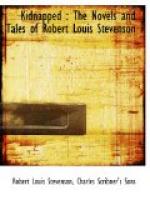Meanwhile the sun was shining outside; and being very cold in that miserable room, I knocked and shouted till my gaoler came and let me out. He carried me to the back of the house, where was a draw-well, and told me to “wash my face there, if I wanted;” and when that was done, I made the best of my own way back to the kitchen, where he had lit the fire and was making the porridge. The table was laid with two bowls and two horn spoons, but the same single measure of small beer. Perhaps my eye rested on this particular with some surprise, and perhaps my uncle observed it; for he spoke up as if in answer to my thought, asking me if I would like to drink ale—for so he called it.
I told him such was my habit, but not to put himself about.
“Na, na,” said he; “I’ll deny you nothing in reason.”
He fetched another cup from the shelf; and then, to my great surprise, instead of drawing more beer, he poured an accurate half from one cup to the other. There was a kind of nobleness in this that took my breath away; if my uncle was certainly a miser, he was one of that thorough breed that goes near to make the vice respectable.
When we had made an end of our meal, my uncle Ebenezer unlocked a drawer, and drew out of it a clay pipe and a lump of tobacco, from which he cut one fill before he locked it up again. Then he sat down in the sun at one of the windows and silently smoked. From time to time his eyes came coasting round to me, and he shot out one of his questions. Once it was, “And your mother?” and when I had told him that she, too, was dead, “Ay, she was a bonnie lassie!” Then, after another long pause, “Whae were these friends o’ yours?”
I told him they were different gentlemen of the name of Campbell; though, indeed, there was only one, and that the minister, that had ever taken the least note of me; but I began to think my uncle made too light of my position, and finding myself all alone with him, I did not wish him to suppose me helpless.
He seemed to turn this over in his mind; and then, “Davie, my man,” said he, “ye’ve come to the right bit when ye came to your uncle Ebenezer. I’ve a great notion of the family, and I mean to do the right by you; but while I’m taking a bit think to mysel’ of what’s the best thing to put you to—whether the law, or the meenistry, or maybe the army, whilk is what boys are fondest of—I wouldnae like the Balfours to be humbled before a wheen Hieland Campbells, and I’ll ask you to keep your tongue within your teeth. Nae letters; nae messages; no kind of word to onybody; or else—there’s my door.”
“Uncle Ebenezer,” said I, “I’ve no manner of reason to suppose you mean anything but well by me. For all that, I would have you to know that I have a pride of my own. It was by no will of mine that I came seeking you; and if you show me your door again, I’ll take you at the word.”
He seemed grievously put out. “Hoots-toots,” said he, “ca’ cannie, man—ca’ cannie! Bide a day or two. I’m nae warlock, to find a fortune for you in the bottom of a parritch bowl; but just you give me a day or two, and say naething to naebody, and as sure as sure, I’ll do the right by you.”




